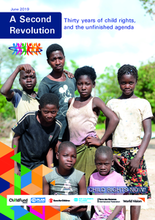This report states that, despite all the advances made since the adoption of the Convention on the Rights of the Child (CRC) 30 years ago, there remains an enormous unfinished agenda. For many millions of children, rights are honoured more in the breach than the observance. Each year, over 5 million children still die from preventable causes. On one measure, over 60% of children at primary school in developing countries fail to meet minimum proficiency in learning. 815 million people experience hunger, and 150 million young children have their long-term physical and mental development stunted by chronic malnutrition. Countless children, both in richer and poorer countries, face a daily reality of poverty, exploitation, violence, neglect and abuse.
The report reviews the situation of vulnerable children and children's rights and concludes with a call to action to improve the lives of children. The report includes a section on children in vulnerable family settings, including a brief case study on deinstitutionalization in Romania and the problems that persist there.
"The situation of children in alternative care – and in institutional care especially – has been a major focus of the Committee on the Rights of the Child," says the report in the section on children in vulnerable family settings. "In the past 30 years new international guidelines, including the UN Guidelines for the Alternative Care of Children in 2009, have promoted policies to prevent unnecessary separation from parents, to support the care of children away from institutions, and establish alternative care options that respond to children’s best interests. These include support for informal kinship care, by relatives or close friends; foster and family-based and family-like placements; residential care, such as emergency and transit care and small group homes; and supervised independent living arrangements for youth."
"Implementation of such guidelines still has some way to go. In Africa, Asia and Latin America there is a concerning trend of increasing numbers of unregistered, privately run alternative care facilities, which lack any formal oversight, and often actively recruit children from their families. For example, in Uganda there were 35 such facilities in the mid-1990s. Today, there are 800."
"Yet in the last ten years, inspired partly by UN Guidelines and the work of the Committee on the Rights of the Child, there have been increased efforts in many countries to develop quality standards and inspection mechanisms for alternative care settings. A growing emphasis has been put on children’s rights and development, with individual case management informed by children’s own views."
The report calls on states to fulfil their commitments with renewed vigour, urgency and imagination, so all children can grow up healthy, educated, safe from violence and free to make choices over their lives.

